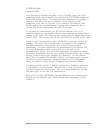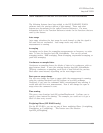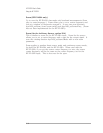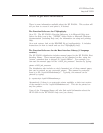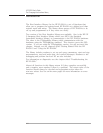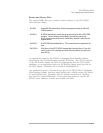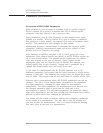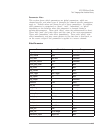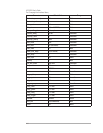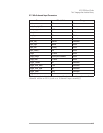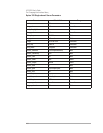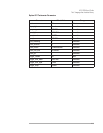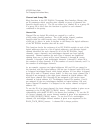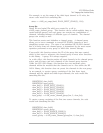
Parameter Information
Description of HP E1432A Parameters
Some parameters, such as range or coupling, apply to specific channels.
When a channel ID is given to a function that sets a channel-specific
parameter, only that channel is set to the new value.
Some parameters, such as clock frequency or data transfer mode, apply
globally to a module. When a channel ID is used to change a parameter
that applies to a whole module, the channel ID is used to determine which
module. The parameter is then changed for that module.
Starting and stopping a measurement is somewhat like setting a global
parameter. Starting a measurement starts each active channel in each
module that has a channel in the group.
After firmware is installed, and after a call to e1432_preset, all of the
parameters (both channel-specific and global) in an HP E1432A module are
set to their default values. For channel-specific parameters, the default
value may depend on the type of channel. Some channel-specific
parameters apply only to a specific type of channel. For example, tach
holdoff applies only to tach channels. Setting such a parameter for a
channel that doesn’t make sense will result in an error.
At the start of a measurement, the HP E1432A firmware sets up all
hardware parameters, and ensures that the input hardware is settled before
starting to take data. The firmware also ensures that any digital filters have
time to settle. This ensures that all data read from the module will be valid.
However, after a measurement starts, HP E1432A parameters can still be
changed. The effect of this change varies, depending on the parameter.
For some parameters, changing the value aborts the measurement
immediately. For other parameters, the measurement is not aborted, but
the changed parameter value is saved and not used until a new
measurement is started. For still other parameters, the parameter change
takes place immediately, and the data coming from the module may contain
glitches or other effects from changing the parameter.
You cannot tell the module to wait for settling when changing a parameter
in the middle of a measurement. The only way to wait for settling is to
stop and re-start the measurement. Also, you cannot disable the settling
that takes place at the start of a measurement.
HP E1432A User's Guide
The C-Language Host Interface Library
4-4



